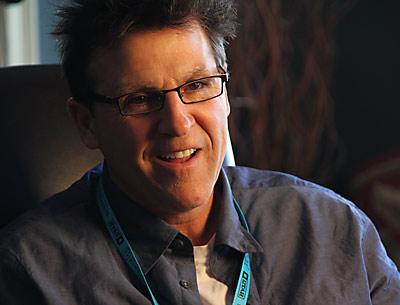Opinion: Does the Machine Care?

Kevin Breslin’s short documentary “#whilewewatch” was shown last Thursday night at Guild Hall. The film, shot within the Occupy Wall Street protest at Zuccotti Park in September, was the latest in Guild Hall’s Red Carpet film series.
The author Steven Gaines moderated a question-and-answer session at the end of the film. During the session, a bearded man of a certain age, who identified himself as being part of the Occupy movement, first berated Mr. Breslin for referring to the woman who coined the “1-percenter” slogan as being “Oriental.” “The word is ‘Asian,’ ” he shouted. The filmmaker apologized for his political incorrectness.
Later the man raged against the machine: “We don’t need your system,” or some such; the system in this case being a well-meaning independent filmmaker and moderator. Mr. Gaines, resorting to humor, told the man he had no dog in the race, that he had simply agreed to a request to moderate, and that by doing so he was in danger of missing the new “Batman” premiere.
For a reviewer who came of age during the protests of the late 1960s and early ’70s, the angry man sounded a bit like Don Quixote raging against a windmill that no longer turns.
Mr. Breslin’s film is provocative, but in unexpected ways. The occupiers talk about being “citizen journalists,” telling a story that they say the established media, co-opted by Wall Street and all things corporate, is missing completely.
Instead of placing flowers in the barrels of rifles pointed at them, they challenge police with their iPhone video apps, shouting, “The whole world is watching,” not on television but on their computers. Well, maybe. More likely the world is busy getting its Facebook fix, or watching Arab citizen-journalists’ reportage of their life-and-death struggles.
I was struck by the narcissism of the movement. Pointing up the injustice and criminality responsible for the yawning gap between the 1-percenters and the 99-percenters is a worthy cause. Unfortunately, Mr. Breslin’s honest reportage found the occupiers not only preaching to the choir but, in full citizen-journalist mode, reporting on their own preaching.
Of course, it’s harder to foment antiestablishment fervor when the president of the United States is protesting the same thing the protesters are. Very strange.
And, where’s the hatred? As many will recall, the thing about the antiwar and civil rights protests that took place from about 1967 through the end of the Vietnam War — protests that spawned the “counterculture” — was the pure hatred generated by establishment types.
The Occupy movement is a sort of caricature of a protest. Occupiers are marching (occupying) against the machine, but the machine doesn’t care. It seems that except for hedge funds and banks, most of the machine is on its ass.
Mr. Breslin’s documentary kept begging the question: If one is really angry about what Wall Street has done, why occupy a private park instead of invading the Stock Exchange or storming the Goldman Sachs bastille?
This also points up something I think about quite a lot, form versus content in the digital age. Occupiers had the means to be citizen-journalists to get out to the world the raw, on-the-street stuff, the straight skinny unadulterated by corporate spin, but the struggle wasn’t there, except for a few man-made dustups with New York’s finest, who, as middle-class types, probably had as much reason to protest the 1-percenters as the occupiers.
Don’t get me wrong, the movement was and is important. The occupiers are saying what a lot of Americans feel strongly. But it’s difficult to “out” the unethical, greedy mother*&)+@!s, when the whole world already knows they’re unethical, greedy mother*&)+@!s.
The government knows it, the people at large know it. Even the greedy mothers know it, which is why they don’t help with the narrative by fighting back. As a result, the choir winds up filming themselves in the mirror.
By offering what the occupiers insist they don’t want and don’t need — that is, a comprehensive view of the movement from the outside — Mr. Breslin succeeds in shedding much needed light on very worthy motives.
